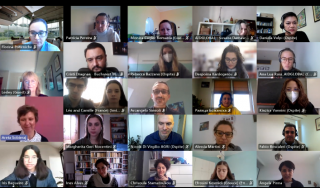The Walk the Global Walk (WtGW) project utilises Global citizenship education (GCE) to engage and mobilise young people to affect change.
By localising the sustainable Development Goals (SDGs), the project aims to create new educational models addressing issues associated with climate change, sustainable development, and our natural environment.
Key global issues relating to migration, climate change and gender equality are being adapted to fit into the formal education curriculum across the 11 participating countries (Albania, Bosnia & Herzegovnia, Bulgaria, Croatia, Cyprus, France, Greece, Italy, Portugal, Scotland and Wales).
In collaboration with Oxfam Italy and the European Union the project connects local authorities, schools, and communities to promote action on three SDGs. Now in its third year, the WTGW project is focussing on SDG 16 ‘Peace, justice and strong institutions’. Last year (2020), the team at the University of Glasgow and Glasgow city council co-organised and participated in several events and activities corresponding to SDG 13 ‘Climate action’. The year’s activities culminated in a European winter school that saw over 20 young leaders from schools across Europe, come together to create a climate action manifesto that would be delivered to local governments, and to make commitments towards taking climate action.
The manifesto was built from engaging and informed discussion between the pupils that took place both before and during the virtual winter school, with pupils interacting with education leaders and sustainability professionals. The young leaders took initiative in starting conversations amongst themselves, through the chat function, discussing the manifesto, and proposed actions. Several pupils delivered bold statements and questions to external guests, highlighting their informed perspective on the steps needed to be taken to achieve SDG 13.
In attendance at the winter school were external stakeholders, such as Kirsty Leask, project manager for the connecting classrooms initiative at Learning for Sustainability Scotland, representatives from the European Union, such as Nicola di Vriglio, a researcher for the agriculture and rural development commission and local municipal council representatives, such as Giorgos Antonopoulos of the Fyli municipality in Greece. The guests gave detailed answers to questions from young leaders, which queried the responses of institutions in tackling climate change whilst discussing strategies for ensuring young people were being equipped with the knowledge, and given opportunities, to become climate leaders [see screenshot above right].
Pledges within the manifesto ranged from individual changes (recycle more and use less plastic for example, to larger systemic changes, for example, infrastructure and funding for sustainable travel and greater public education) were agreed to be fundamental towards securing a greener future. Many pupils also called for more climate education and funding for ‘green’ initiatives both in schools and across society.
Despite the complexity of organising a virtual school for over 70 people across Europe, the event was a success. The discussions between pupils, teachers, and local, national and international authorities resulted in a comprehensive and hopeful climate action manifesto. The event highlighted the potential of collaborative working, and the need for young people to be listened to, and involved, in taking steps towards achieving the sustainable development goals.
The WtGW project is Coordinated in Scotland by Dr Ria Dunkley and Dr Ines Alves, with support from Ben Murphy and Lesley Atkins (Education Officer).
bridge media | Releases Nike Shoes
- Log in to post comments














Latest Comments